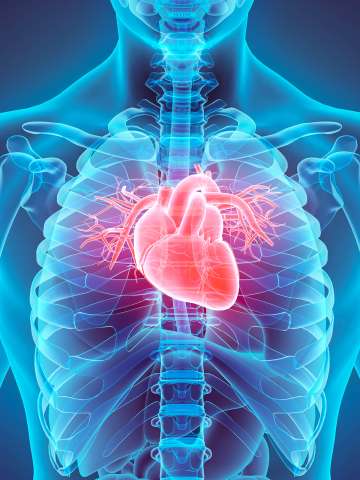What Cardiology reveals about managing high blood pressure
What Cardiology reveals about managing high blood pressure
Blog Article
Recognizing the Significance of Cardiology in Modern Health Care Solutions
Cardiology plays an essential duty in modern healthcare, particularly as cardiovascular disease remains to be the leading root cause of death worldwide. Developments in diagnostics and therapy have transformed client care, allowing earlier interventions and enhanced results. Moreover, the change in the direction of precautionary cardiology equips individuals to manage their health proactively. As technology remains to progress, the assimilation of cutting-edge options may even more redefine cardiology's influence on public health, motivating a closer examination of arising fads and their ramifications.
The Occurrence of Heart Disease and Its Influence On Public Health
Although cardiovascular disease stays the leading cause of fatality internationally, its effect extends much beyond private clients to affect public wellness systems and economic climates. The high occurrence of cardiovascular disease positions a considerable pressure on health care sources, requiring enhanced funding for therapy, avoidance, and rehabilitation programs. Public health campaigns must attend to risk elements such as weight problems, smoking, and inactive lifestyles, which contribute considerably to the rising incidence of heart conditions.Moreover, the financial burden associated with cardiovascular disease is enormous, including not only direct medical prices yet additionally indirect expenditures related to shed productivity and premature death. Communities deal with obstacles in handling these costs, typically bring about differences in healthcare access and end results. As the population ages and lifestyle-related risks continue to rise, the necessity for effective cardiology interventions becomes vital. Subsequently, resolving heart problem is not just a matter of individual health and wellness however likewise an essential public wellness top priority.
Breakthroughs in Heart Diagnostics and Imaging Techniques
Current improvements in cardiac diagnostics and imaging techniques have transformed the field of cardiology, enhancing the capacity to detect and monitor cardiovascular disease. Strategies such as cardiac MRI, CT angiography, and echocardiography have come to be significantly advanced, offering comprehensive photos of cardiac structures and features. These techniques permit the very early identification of conditions like coronary artery condition, heart failing, and valvular disorders.Moreover, developments in non-invasive diagnostics, such as wearable technology and remote surveillance gadgets, have encouraged clients and doctor. These tools assist in real-time tracking of heart rhythms and various other vital signs, bring about timely treatments. Furthermore, expert system is being integrated right into imaging analysis, enhancing accuracy and performance in medical diagnosis.
Technologies in Treatment Options for Heart Conditions
Recent advancements in cardiology have resulted in significant innovations in treatment options for heart problems. These include innovative surgical strategies that boost step-by-step outcomes and emerging drugs that offer brand-new opportunities for treatment. As the field progresses, these innovations play a crucial duty in improving individual treatment and outcomes.
Advanced Surgical Techniques
Advancements in medical techniques have transformed the landscape of cardiology, supplying new expect patients with heart conditions. Minimally intrusive treatments, such as catheter-based treatments, have significantly minimized recuperation times and hospital keeps. Techniques like robotic-assisted surgery improve accuracy, enabling doctors to navigate intricate physiological structures with higher accuracy. Improvements in imaging innovation assist in real-time visualization throughout treatments, boosting end results. Transcatheter aortic valve replacement (TAVR) exemplifies an advancement in treating aortic constriction, making it possible for shutoff replacement without open-heart surgical treatment. Furthermore, hybrid methods that combine catheter-based and surgical techniques offer tailored solutions for numerous heart problems. These sophisticated surgical techniques not only boost person safety and security however likewise expand therapy choices, underscoring the crucial function of advancement in modern cardiology practices.
Arising Drugs and Therapies
As the landscape of cardiology remains to evolve, arising therapies and medicines play a critical role in boosting treatment alternatives for heart disease. Advancements such as novel anticoagulants and progressed lipid-lowering agents have actually transformed the monitoring of heart diseases, considerably decreasing person morbidity and mortality. Additionally, the advancement of gene therapies and regenerative medication uses promising methods for treating problems formerly considered incurable. Scientific tests are constantly disclosing the effectiveness of these treatments, pressing the limits of typical treatments. The assimilation of digital health innovations promotes customized medication, allowing for tailored treatment plans based on hereditary and way of living aspects. Collectively, these innovations highlight the vibrant nature of cardiology, boosting patient outcomes and redefining requirements of treatment in contemporary medical care.
The Role of Preventive Cardiology in Client Care
Precautionary cardiology plays a crucial duty in patient care by concentrating on the recognition of threat factors that contribute to heart illness. Via way of living alteration techniques and very early detection methods, doctor can properly lower the occurrence of cardio occasions - Cardiology care. This proactive technique not just boosts person end results yet additionally advertises long-lasting health and wellness
Risk Factor Identification
While heart diseases continue to be a leading reason of morbidity and death worldwide, effective risk variable recognition functions as a keystone of preventative cardiology. Determining danger aspects such as high blood pressure, hyperlipidemia, diabetes, and family background is essential for early treatment. Healthcare experts utilize different screening approaches to examine these elements, enabling customized safety nets. Additionally, understanding an individual's lifestyle selections, such as cigarette smoking and physical lack of exercise, even more educates danger assessments. This thorough examination enables clinicians to create customized treatment plans focused on mitigating threats. By focusing on risk aspect recognition, healthcare systems can improve patient results and reduce the general burden of cardio conditions, ultimately adding to boosted public health and wellness strategies and resource appropriation.
Lifestyle Modification Methods
A plethora of studies highlights the important duty of way of life alteration strategies in decreasing heart disease threat. These techniques incorporate nutritional adjustments, increased exercise, cigarette smoking cessation, and weight administration. By taking on a heart-healthy diet abundant in fruits, veggies, entire grains, and lean healthy proteins, people can decrease cholesterol degrees and my website blood stress. Normal physical task strengthens the heart and improves overall cardio health and wellness. In addition, giving up smoking cigarettes greatly reduces the risk of heart problem and enhances recuperation prices for those with present problems. Weight monitoring additionally adds to cardiovascular health and wellness by reducing other risk factors such as diabetes and high blood pressure. Applying these way of living alters not only promotes specific wellness yet likewise acts as a cornerstone of precautionary cardiology in person treatment.
Early Discovery Strategies
Way of life alterations significantly add to lowering heart disease risks, however they are most effective when coupled with early discovery methods. Preventative cardiology highlights the value of recognizing prospective heart problems before they escalate into significant conditions. Methods such as blood stress monitoring, cholesterol testing, and advanced imaging modern technologies like echocardiograms play crucial functions in evaluating cardiovascular health and wellness. Biomarkers and hereditary testing additionally enhance the accuracy of very early discovery, permitting tailored preventative methods. Regular heart threat assessments encourage doctor to step in proactively, possibly avoiding cardiac arrest and strokes (Cardiology care). By integrating these early detection techniques right into regular care, individuals can take advantage of timely way of life treatments and targeted treatments, eventually boosting outcomes and improving lifestyle
Integrating Modern Technology Into Cardiology Practices
As advancements in innovation proceed to improve numerous fields, the integration of ingenious devices and systems right into cardiology methods has actually come to be essential for improving individual treatment and end results. Telemedicine systems allow cardiologists to check patients remotely, enhancing access to care while minimizing the problem on medical care centers. Wearable tools, such as smartwatches, enable continuous heart rate monitoring, notifying both clients and doctors to prospective issues in real-time. Additionally, synthetic intelligence (AI) is being utilized to analyze vast amounts of heart information, helping in early diagnosis and tailored therapy strategies. Advanced imaging techniques, consisting of 3D echocardiography, improve visualization of heart frameworks, bring about extra specific treatments. Electronic health documents (EHRs) improve client information management, making certain that cardiologists have prompt access to important data. With each other, these technological developments are transforming cardiology, advertising positive management and boosted health and wellness outcomes for patients with cardio problems.
The Relevance of Individual Education and Interaction
Patient education and engagement play an essential role in the administration of cardio health and wellness. By outfitting clients with expertise about their problems, therapy alternatives, and way of living changes, health care service providers equip individuals to take an active role in their treatment. This aggressive method can bring about improved adherence to recommended drugs, nutritional modifications, and workout regimens, ultimately minimizing the threat of complications.Engagement also fosters a strong patient-provider partnership, encouraging open interaction and trust fund. When people feel informed and involved, they are most likely to voice concerns and ask inquiries, which site link can lead to much better scientific end results. In addition, instructional resources, such as workshops or digital systems, can enhance understanding and advertise self-management approaches. Overall, focusing on person education and involvement is vital for enhancing cardiovascular health and wellness, enhancing high quality of life, and minimizing medical care prices linked with cardiovascular illness.
Future Fads in Cardiology and Their Possible Influence

Frequently Asked Questions
What Lifestyle Adjustments Can Decrease Heart Illness Risk?
The present question addresses way of life adjustments that can significantly minimize heart condition risk. Dr Garcia. Adopting a balanced diet regimen, taking part in normal exercise, maintaining a healthy weight, managing anxiety, and preventing cigarette can especially improve cardio health and wellness
Just How Can I Acknowledge Early Signs of Heart Troubles?
Identifying early signs of heart troubles entails monitoring signs such as upper body discomfort, lack of breath, exhaustion, and uneven heart beat. Prompt recognition of these indications can prompt needed medical examination and treatment for better end results.
What Are the Distinctions Between Cardiologists and Heart Surgeons?
The differences in between cardiologists and cardiac surgeons hinge on their roles; cardiologists mainly diagnose and handle heart disease via non-invasive methods, while heart surgeons execute operations to correct architectural heart problems. Each plays an essential, distinctive function.

Just how Usually Should I Obtain My Heart Wellness Checked?
The regularity of heart medical examination differs based upon private threat aspects. Typically, grownups ought to undertake examinations every one to 2 years, while those with status quo may need more constant analyses as recommended by health care specialists.
What Role Does Genes Play in Heart Illness Danger?
Genes significantly affects cardiovascular disease danger, with familial patterns showing acquired conditions. Details genetics can incline individuals to high blood pressure, cholesterol problems, and various other cardiovascular issues, highlighting the importance of genetic testing in assessing heart health and wellness. Heart illness stays the leading reason of death internationally, its effect prolongs far past individual clients to impact public wellness systems and economies. Public health and wellness initiatives must address threat factors such as excessive weight, smoking cigarettes, and sedentary way of lives, which contribute significantly to the climbing occurrence of heart conditions.Moreover, the economic concern associated with heart condition is tremendous, including not only straight medical expenses yet likewise indirect expenditures associated to shed efficiency and premature mortality. Preventative cardiology plays a necessary function in individual treatment by focusing on the recognition of threat elements that add to heart condition. Man-made knowledge (AI) and equipment knowing are enhancing diagnostics and person monitoring, allowing early discovery of heart conditions. The differences in between cardiologists and cardiac surgeons exist in their roles; cardiologists primarily handle and detect heart conditions via non-invasive methods, while cardiac doctors do medical procedures to correct structural heart problems.
Report this page